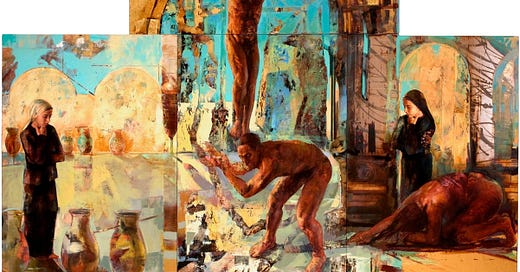This coming sabbath marks the third Sunday of Advent when the lectionary will demand that we once again hear a song that should tighten our collective sphincters. When Mary reaches the home of her cousin Elizabeth, herself pregnant with John the Baptist, the God-bearer exclaims:
“My soul magnifies the Lord, and my spirit rejoices in God my Savior, for he has looked with favor on the lowliness of his servant. Surely, from now on all generations will call me blessed; for the Mighty One has done great things for me, and holy is his name. His mercy is for those who fear him from generation to generation. He has shown strength with his arm; he has scattered the proud in the thoughts of their hearts. He has brought down the powerful from their thrones, and lifted up the lowly; he has filled the hungry with good things, and sent the rich away empty…”
As Samuel L. Jackson’s Jewels tells Tim Roth’s Pumpkin in Pulp Fiction:
“If you heard it, that meant your ass.”
No wonder many churches persist in hiring cantors to sing it in gilded Latin— better to secure the song safely away in a dead language. If we’re bold to venture honesty, to hear that rich folks (like most of us) will be sent empty away does not strike us as good news of great joy. The Lord showing us the strength of his arm (against folks like us), toppling us from our privileged perches, does not much sound like the Jesus we think we know.
I’m not sure what it might mean for us who are prideful to be scattered in the imaginations of our hearts, but I’m fairly certain that when such a scattering comes, I’d rather you go first.
Mary in Luke’s first chapter seems to be the source material for her boy’s Beatitudes. Stanley Hauerwas says of the Beatitudes, “They are not a list of requirements, but rather a description of the life of a people gathered by and around Jesus.” The Kingdom, as Jesus breaks it down— and, he should know since he IS the Kingdom— belongs to those who do not really resemble you, dear reader.
Just as with the Beatitudes, the Magnificat begs still another question:
Can the poor and the oppressed nonetheless also be unrighteous?
Are the poor blessed by virtue of being poor, possessing an inherent righteousness?
Or do they not also need atonement made?
Can a victim of systemic sin still be a sinner in need of forgiveness?
And speaking of victims, what about victimizers? If God’s preferential option is for the former, can the latter be justified? After all, seldom do we include in our manger scenes or Christmas celebrations the last song sung in Luke’s nativity wherein Simeon calls the baby Jesus “Salvation” and foreshadows the heartache Mary will suffer as a result of her son’s sufferings, for our sake.
“For us and our salvation,” as the Nicene Creed confesses it.
Sure enough— mark my words and your calendar— this coming Sunday Mary’s fist-shaking protest song will be dispatched to lay Law rather than proclaim Gospel.
Keep reading with a 7-day free trial
Subscribe to Tamed Cynic to keep reading this post and get 7 days of free access to the full post archives.





